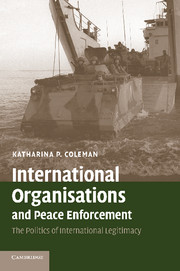Book contents
- Frontmatter
- Contents
- List of maps
- List of figures
- List of tables
- Acknowledgements
- List of abbreviations
- 1 Introduction
- 2 States, international organisations, and legitimacy: a theoretical framework
- 3 Peace enforcement through sub-regional organisations: the Economic Community of West African States and Operation Liberty in Liberia
- 4 Peace enforcement through sub-regional organisations: the Southern African Development Community and Operation Sovereign Legitimacy in the Democratic Republic of Congo
- 5 Peace enforcement through sub-regional organisations: the Southern African Development Community and Operation Boleas in Lesotho
- 6 Peace enforcement through a military alliance: the North Atlantic Treaty Organisation and Operation Allied Force in Kosovo
- 7 Peace enforcement through a global organisation: the United Nations and INTERFET in East Timor
- 8 Conclusion
- Epilogue: UN intervention in Lebanon
- Appendix: Summary of interviews conducted
- Bibliography
- Index
4 - Peace enforcement through sub-regional organisations: the Southern African Development Community and Operation Sovereign Legitimacy in the Democratic Republic of Congo
Published online by Cambridge University Press: 10 November 2010
- Frontmatter
- Contents
- List of maps
- List of figures
- List of tables
- Acknowledgements
- List of abbreviations
- 1 Introduction
- 2 States, international organisations, and legitimacy: a theoretical framework
- 3 Peace enforcement through sub-regional organisations: the Economic Community of West African States and Operation Liberty in Liberia
- 4 Peace enforcement through sub-regional organisations: the Southern African Development Community and Operation Sovereign Legitimacy in the Democratic Republic of Congo
- 5 Peace enforcement through sub-regional organisations: the Southern African Development Community and Operation Boleas in Lesotho
- 6 Peace enforcement through a military alliance: the North Atlantic Treaty Organisation and Operation Allied Force in Kosovo
- 7 Peace enforcement through a global organisation: the United Nations and INTERFET in East Timor
- 8 Conclusion
- Epilogue: UN intervention in Lebanon
- Appendix: Summary of interviews conducted
- Bibliography
- Index
Summary
Founded in 1992, the Southern African Development Community (SADC) is the youngest and perhaps the most paradoxical organisation studied in this book. Throughout the 1990s, it lacked functional institutional structures for dealing with regional peace and security issues. As late as December 2000, the SADC secretariat insisted that it had no mandate to address political peace and security questions. Nevertheless, in 1998 two major military interventions were launched under SADC auspices. In August 1998, Zimbabwe, Angola, and Namibia sent troops into the Democratic Republic of Congo (DRC) to counter an invasion from Rwanda and Uganda that threatened to topple the DRC's President Laurent Desiré Kabila. One month later, South Africa and Botswana intervened in Lesotho to support Prime Minister Pakalitha Mosisili against internal unrest and an army mutiny following a controversial general election. Both interventions, codenamed Operation Sovereign Legitimacy and Operation Boleas, respectively, claimed SADC auspices, and together they helped define SADC's role in regional peace enforcement.
This chapter focuses on SADC's role in Operation Sovereign Legitimacy, leaving the analysis of Operation Boleas for chapter 5. After providing an explanation for SADC's lack of security institutions and some background information on the DRC intervention, it examines why Zimbabwe chose to launch Operation Sovereign Legitimacy through SADC. It argues that neither international law nor burden-sharing concerns can explain this decision.
- Type
- Chapter
- Information
- International Organisations and Peace EnforcementThe Politics of International Legitimacy, pp. 116 - 159Publisher: Cambridge University PressPrint publication year: 2007

